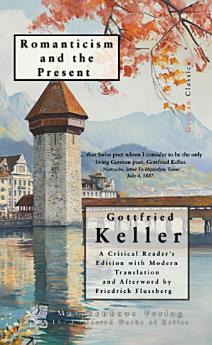Romanticism and the Present
May 2024 · Marchen Press
Ebook
37
Pages
family_home
Eligible
info
reportRatings and reviews aren’t verified Learn More
About this ebook
Here Keller makes a clear argument that he basically shares the views of the German realists in the field of aesthetics. He argues that poetry requires a favorable terrain or good soil on which its entities can operate and live accordingly but also that every landscape also needs "its poetic inhabitants." Here he elucidates his political philosophy which he dramatically and artistically extrapolates upon in his later works. To Keller, literary moderation results from the historical fact that the liberal revolution of 1848 was successful in Switzerland. Keller delineates a distinction between the innocuous and charming romanticism of the German school, epitomized by works such as Tieck's "Octavian" and Uhland's ballads, and the more contrived and reactionary strains seen in other contexts. The narrative unfolds against the backdrop of the scenic Heidelberg, where the author muses on the intrinsic longing evoked by picturesque landscapes and how this sentiment is uniquely articulated through romanticism. As the narrative progresses, Keller posits that all poetry necessitates a conducive environment, a nurturing terrain that shapes its characters and themes. This concept is juxtaposed with Goethe's profound connection to Homeric landscapes and the contrasting Northern and Southern European milieus that give rise to distinct poetic archetypes. The middle zone of the Rhine, with its moderate mountains and storied past, is portrayed as ideally suited to the expressions of romanticism, where the land and its poetic inhabitants coexist in a symbiotic relationship. This reflection underscores the cultural and historical significance of romanticism in capturing the spirit of the land and its people. Keller further contrasts the idyllic visions of romanticism with the turbulent present, marked by revolutionary fervor and societal transformation. The Baden Revolution and the broader European revolts are depicted as rich sources of poetic inspiration, fostering a new era of action and creativity. The author vividly describes the scenes of revolution, where the populace, adorned with flowers and carrying weapons, embodies a living poetry that transcends the written word. This juxtaposition of past and present highlights the enduring relevance of romanticism while acknowledging the dynamic interplay between tradition and modernity in shaping the cultural and poetic landscape. This modern critical reader's translation from the original German includes supplementary materials that bring Keller's life and impact to life. Nietzsche considered Keller to be one of the greatest living poets of his time. However, his works are rarely found in other languages, so most people today are unaware of who he was or why he was important. This edition remedies that situation by providing a clear, accessible version of Keller's original German writing and offering insight into his broader ideas and the philosophical landscape in which he operated. Working directly from Keller's German manuscripts, this new translation delivers literary excellence and scholarly depth with amplifying materials. Readers will discover not only Keller's powerful voice but also the philosophical currents that shaped an entire era of German thought. The edition includes an illuminating afterword tracing Keller's intellectual relationship with Nietzsche, revealing the fascinating dialogue between two of the period's most influential minds. A comprehensive timeline connects the major events of Keller's life with his published works, and a detailed index provides an authoritative guide to his complete writings. Together, these materials provide newcomers and serious readers with everything needed to appreciate one of literature's most overlooked figures.
About the author
One of Nietzsche's favorite living poets (the only real Swiss poet in his opinion, Keller was a major Swiss poet and writer, Keller is best known for his novel "Green Henry" (German: "Der grüne Heinrich"). His work is representative of the Realist movement, which sought to depict life and society as they were. Keller's stories often reflect the conflict between individual creative drives and the constraints of society. His novel "The People of Seldwyla" was one of Nietzsche's favorite.
Rate this ebook
Tell us what you think.
Reading information
Smartphones and tablets
Install the Google Play Books app for Android and iPad/iPhone. It syncs automatically with your account and allows you to read online or offline wherever you are.
Laptops and computers
You can listen to audiobooks purchased on Google Play using your computer's web browser.
eReaders and other devices
To read on e-ink devices like Kobo eReaders, you'll need to download a file and transfer it to your device. Follow the detailed Help Center instructions to transfer the files to supported eReaders.







